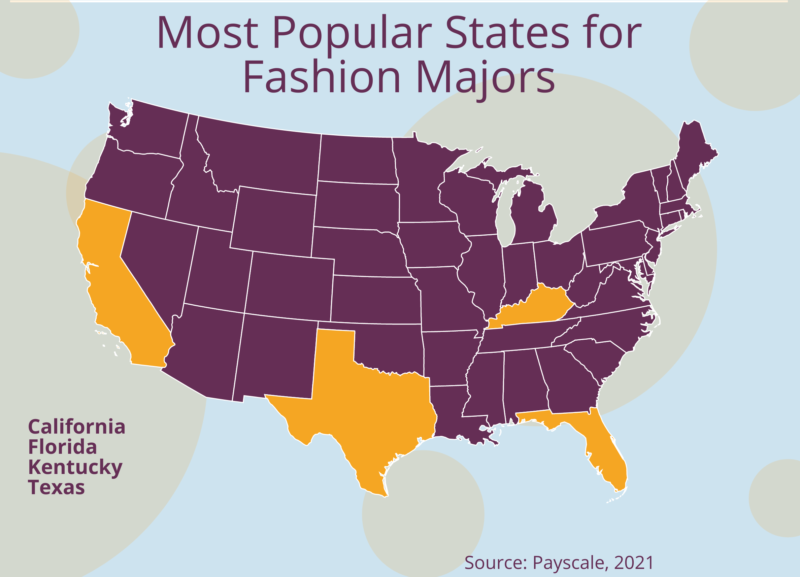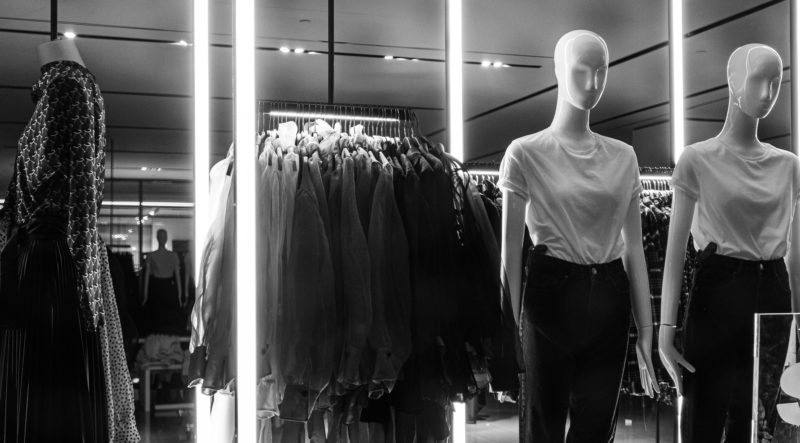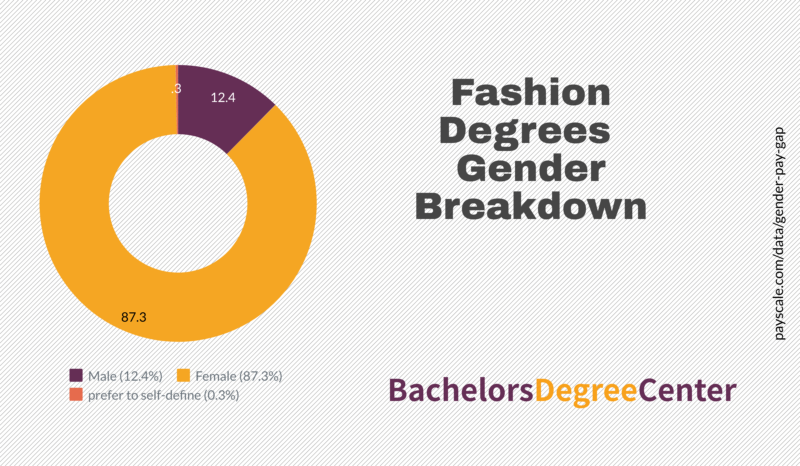Key Information:
- Fashion degrees offer various specializations, from design and merchandising to fashion communications.
- Graduates can enter various areas within the fashion industry, including design, marketing, and management.
- It’s crucial to choose programs accredited by recognized bodies to ensure quality education and respect in the industry.
Those who want to work in fashion often go to school for a bachelor’s degree in fashion design. Some students choose fashion merchandising to expand their business knowledge and attract more job offers. These programs include courses in design, art, fabrics, textiles and computer-aided design (CAD). Getting a formal education enables students to create portfolios that draw attention to their talent. Employers use portfolios to evaluate a designer’s creativity and skill.
A lot of the education occurs offline both in completing assignments and working in an internship. Without work experience, new graduates may find a hard time getting an entry-level role with their favorite designers. Internships and work experience help student designers learn the fundamentals of designing and producing accessories and clothing.
So should you get a degree in fashion? Let’s start by examining the following questions:
- Which degree is best for fashion designing?
- Is a fashion degree worth it?
Is a fashion degree worth it?
Everybody uses clothes, hats, shoes and accessories. Jewelry, gloves, neckties and bathing suits are all fashionable items that most people have in their drawers and closets. Although there are many different categories of fashion, such as commercial and haute couture, all these items need inspiring designers to get them off the paper and into retail stores and fashion boutiques.
Fashion often refers to couture clothing and designer outfits. Apparel often refers to clothing produced for mass distribution. These are affordable clothes that most people wear. Since the 1970s, the line between these categories has blurred.
People spend more money on clothing than many other categories of discretionary spending. That makes it a great place for innovative designers because they can get backing and have a good chance of selling the finished product. In fashion, products have short life cycles because consumers want to see new designs every season, every year. That makes it tough to predict how many items of each design to produce in order to make a profit without having too much excess inventory on hand.
Accreditation for Fashion Programs
It’s critical to choose accredited online fashion degrees because this ensures that you receive an education that meets the standards expected by prospective employers. Online fashion degrees accredited by the relevant organizations make it possible to transfer credits to another program or to pursue a master’s in fashion design or merchandising.
The National Association of Schools of Art and Design (NASAD) provides accreditation for online and traditional fashion schools. Employers and academic institutions also respect degrees from schools that have been approved by the Accrediting Council for Independent Colleges and Schools (ACICS).
Colleges and universities in the United States must be approved by one of the seven regional accrediting bodies. These organizations evaluate schools on a regular basis and are organized by geography, as follows: Middle States, North Central, Southern, New England, Western and Northwest. Agencies review the entire school instead of specific programs.
Types of Fashion Degrees
There are many types of online fashion degree programs as well as areas of specialization. Review the online fashion degree programs and specializations below to determine which ones might meet your career goals best.
Fashion design. You can specialize in sportswear, menswear, knitted textiles, and other fashion design niches. Designing clothes involves doing the necessary research for your target demographic and mastering skills such as fabric technology, drawing, computer-aided design, and pattern design. In order to create something new, you need to learn about the history of fashion and how clothes impact culture.
Fashion merchandising. Learn how fashion ranges translate to marketability and managing the purchasing process. Aspects of this degree include supply chain management, visual merchandising, ethical issues and fashion textiles.
Fashion communications and promotion. Students in these fields learn about the visual communication side of the fashion industry. These degrees focus on film, photography, digital media, music, social media, app design and styling. After completing this degree, many students go on to work in fashion media, marketing, public relations and advertising.
Fashion styling. With a degree in fashion styling, students learn how to match fashion designs with makeup, hair in clothing. Graduates go on to pursued support roles in fashion shows, commerce and the media.
Fashion photography. Students with have a passion for fashion and photography can learn about location shooting, digital image production and editing. Many graduates work for magazines, art galleries and advertising firms.
Jewelry design. This degree covers jewelry manufacturing, design and marketing. Students who study jewelry design deal with precious metals, the design and creation of customized pieces, and the intricacies of this boutique industry.
Fashion manufacturing. Students who want to learn more about accessories such as couture bracelets and necklaces and sportswear may find this degree suits them best. Accessories covered in these courses include wallets, purses, boots, hats and belts.
Fashion contour. Students learn how to create intricate designs for intimate apparel, lingerie, nightwear, swimwear and other structured clothing. The technology used to create this includes 3D prototyping and graduates emerge with specialized skills that may be in demand in their area.
Fashion journalism. Students who love to write and have an eye for fashion can use this degree to seek jobs on the front facing side of the industry. From print to broadcast to online media, fashion journalism graduates can find a variety of jobs in the field. Skills mastered in these programs include styling, live reporting, fashion terminology, and photography. Students also receive a firm foundation in fashion design.
Fashion management. From garment construction to financing a new fashion line, students master management techniques such as sustainability, merchandising and social responsibility.

Some of the classes that are universal to fashion degrees include the following:
- Color Theory
- Computer Assisted Design (3D)
- Visual Culture
- Fashion Studio
- Textile Science
- Life Drawing
- Fashion History
- Portfolio Development
- Brands and Identity
- Business of Fashion
- Fashion market research
- E‑commerce
- Trend analysis
- Marketing and promotion
- Visual merchandising
- Costume design
- Product development
- Graphic Design
Certifications for Fashion
There are many online options for a certificate in fashion design, including Villioti Fashion Institute. This fashion design certificate program gives students an in-depth look at the theory behind the fashion industry. Students also learn the skills needed to establish a startup by obtaining funding and preparing designs and samples. Fashion design certificates often cover design and garment manufacturing along with courses that help students prepare for jobs in commercial or haute couture related businesses.
Villioti’s online fashion design certificate emphasizes the basics of designing manufacturing fashion items. Students gain specialized knowledge of digital marketing and learn how to succeed as entrepreneurs. Graduates need these skills in order to prove themselves to hiring managers in retail and fashion.
There are also many free online fashion design courses with certificates. Skillshare has several excellent free online fashion design courses with certificates in general fashion design and specialty areas. Students who complete a fashion design certificate program have an advantage over job applicants with a generic degree or no experience in the field.
With a fashion design certificate online, you can learn from home and set your own schedule. In this way, fashion design certificate programs allow for much more flexibility than learning in a traditional classroom setting. Many students attend free online fashion designing course with certificate to gauge their interest in the field. Fashion design certifications enhance students creative, copywriting, illustration, photography and marketing skills. With a certificate in fashion design, Graduates can start their own T‑shirt design business or seek an internship with a large metropolitan fashion house.
Skillshare has several fashion design certificate online programs to choose from. Many of them don’t cost any money to attend. These fashion design certificate programs require no formal training and have much more flexibility than traditional degrees. For students looking for a free online fashion designing course with certificate, this is a great place to start.
Choose from one of the course providers below to begin your journey into the fashion industry:
- Fashion Premier Academy
- University of Fashion Certification
- IAP College’s Fashion Design Course
- Coursera’s Learn Fashion Course
- Sew It Academy’s Courses
- Udemy’s Intro to Fashion Illustration Course
- Snapfashun’s Course
Although a free online fashion design course with certificates can bolster so your resume, it will not replace a formal degree and work experience. There are still many benefits to completing free online fashion design courses with certificates. If your employer is asking for certain fashion design certifications, you will probably be able to find them online. Fashion design certificates are also a great way to expand your skillset into a certain area or to show mastery of the topics covered by the online fashion design certificate.
Careers in Fashion
Students may wonder what jobs with a fashion marketing degree might appeal to them. it’s good to understand what jobs with a fashion merchandising degree are available in the market. This will give you a good idea of what the job market will be like when you graduate.

What jobs can you get with a fashion merchandising degree? Let’s start with career opportunities you can get with a degree in fashion merchandising, such as the following:
- Costumer
- Department Manager
- Fashion Journalist or Editor
- Advertising Copywriter
- Fashion Advertising Director
- Fashion Consultant
- Fashion Coordinator
- Fashion Designer
- Buyer or Forecaster
- Fashion Editor
- Product Manager
When you study fashion, you may find many different jobs. You may work on the business side of a fashion company rather than the creative side.
What kinds of jobs are there in the fashion industry? There are a variety of job titles in fashion. Different kinds of jobs in the fashion industry include working directly in fashion or for publications that feature fashion. Among the different kinds of jobs in fashion there are all the traditional layers of management and support staff. So, some job titles are very similar well others might be tailored to specific components of the industry.
What kinds of jobs are there in the fashion industry? Some of this depends on whether you have a fashion degree or also have a business degree, such as an MBA. If a student wants to move into management, besides getting their feet wet with an internship, they should have the academic background potential employers expect.
Job titles in the fashion industry include designer, styler, purchaser, director, manager, and many others. For students looking for specific job titles in fashion, it’s important to establish career goals prior to choosing an online certificate or degree program. Different kinds of jobs in the fashion industry require vastly different skills. For example, students need to know how to sew as well as draw if they want to present finished pieces to potential investors or employers.
What kinds of jobs are there in the fashion industry? Different kinds of jobs in fashion include every type of working environment. so, if a student wants to work in a corporate office, they can find such a setting with a fashion merchandising degree?
Jobs with a fashion merchandising degree often require the ability to successfully forecast fashion trends. What jobs can you get with a fashion merchandising degree? Many people leverage this degree when seeking jobs in purchasing or getting back-office jobs in accounting or related fields.
Jobs you can get with a fashion merchandising degree will take advantage of your diverse background in business and creative arts. Graduates who want to know what jobs you can get with a fashion degree should talk with the admission staff at online schools and traditional schools to see where graduates currently work. Job titles in the fashion industry sometimes have fun or unusual phrasings such as creative detector or chief fashionista.
Obtaining an MBA along with your fashioned degree can widen your pull of jobs that you qualify for. When you understand how business works, you qualify for many more jobs with a fashion design degree. What jobs can you get with a fashion degree based on location? jobs you can get with a fashion degree vary based on location. For example, you can find a job easier in New York City than in Boise, ID.
Jobs with a fashion degree in fashion design include the following:
- fashion journalism
- fashion buyer
- pattern maker
- stylist
- retail manager
- visual merchandiser
- textile designer
- blogger or influencer
- brand manager
- marketing specialist
What jobs can you get with a fashion degree? Unfortunately, according to the U.S. Bureau of Labor Statistics, there is a declining job market for fashion design majors. That means that when you get out of school, you’ll be competing with more people for the same number of job openings. So, it’s important to fill your resume with things that stand out. You may have to be prepared to move to a major city such as NYC or Los Angeles so that you can take advantage of greater job opportunities there.
What jobs can you get with a fashion design degree? Whether you want to write for a fashion magazine or become a store brand manager, you’ll need an internship at a business that meets your career goals. Jobs in the fashion industry with a business degree include forecasting, finance and management roles in fashion-related industries.
What kinds of jobs are there in the fashion industry?
- jobs you can get with a fashion merchandising degree
- jobs with a fashion marketing degree
- jobs you can get with a fashion design degree
Jobs with a fashion degree often require a concentration in a particular area. For example, LIM College has a fashion marketing degree for students who want practical experience about how to get their designs in stores and on runways. Courses in the program include how to forecast fashion trends and drive up sales by finding the right marketing channels for target customers. Students with fashion marketing skills have a wide variety of possible career paths.
Jobs with a fashion design degree include the following:
- FASHION MARKETING MANAGER: If you choose a job in this field you will be responsible for finding ways to market fashion brands. Fashion marketing managers create advertising campaigns and manage social media and digital channels for apparel and other fashion products. This job may involve going to new store openings and working behind the scenes to organize photoshoots.
- FASHION BUYER: This is one of the more lucrative jobs in the fashion industry with a business degree. Fashion buyers are responsible for purchasing close to retail stores. If you have a keen interest in fashion and can use qualitative and quantitative data to forecast what customers like, you will do well in this field. Wrong orders can result in high leftover inventory and lost profits.
- STORE PLANNER: What jobs can you get with a fashion design degree? If you want to work in retail, this position might be a good fit. Store planners are the interior designers that fit out new retail stores to make them more appealing to customers. If you understand human psychology and have a good eye for positioning racks, mannequins and displays to attract the most attention, this could be the job for you. The role demands creativity, quantitative research and a deep understanding of the retail business.
Jobs you can get with a fashion design degree range from fashion houses to retail stores to corporate offices. It’s important to understand where you want to go so that you can tailor your education and work experience to help you get there.
Salary
According to the BLS, despite the declining job market, graduates can still command a respectable fashion degree salary. For example, a fashion merchandising degree salary can exceed six figures and averages $32,000 and $53,000, depending on the student’s experience. It’s important to note that beginning salaries in fashion can be quite low. Continuing your education after a degree in fashion merchandising salary can help you make the leap to a higher master’s degree in fashion merchandising salary.
Fashion design degree salary ranges depending on location, experience, and education level. The average fashion marketing degree salary is $53,000.
Here are more examples of fashion degree salary ranges for various specializations:
- Interns lucky enough to get paid might make a fashion design degree salary between $32,000 and $38,000.
- The fashion degree salary for marketing coordinators averages from $42,000 to $55,000 based on the type of company they work for and their geographic location.
- Fashion marketing specialists with less than five years’ experience make between $45,000 and $52,000. However, with a promotion, they can become fashion marketing managers making $64,000 to $89,000.
Whether graduates start with a fashion merchandising degree salary or degree in fashion merchandising salary, they can boost their earning potential with a master’s degree in fashion merchandising salary.

Professional Organizations
Building connections is important in any industry. However, it is the lifeblood of the fashion industry. In order to succeed, you need to meet people who can give you the opportunity to show your talents and help you develop your sense of style. Professional organizations are a great place to find mentors and other students with similar interests. Listed below, find some of the largest professional organizations for those in the fashion and apparel industries.
- American Apparel Producers’ Network
- Fashion Group International
- International Textile and Apparel Association
- NRF: National Retail Federation
- Council of Fashion Designers of America
- Costume Society of America
- Association of Sewing and Design Professionals
Now that you know what to expect from a fashion degree in marketing, business, communications, and other specializations, you can make the best decision for your online or traditional education plan. Keep in mind that, although the industry is somewhat crowded at the moment, people with passion can inspire confidence wherever they go.
Remember that you can use online fashion certifications and master’s degrees to supplement your experience and education. In a competitive field, it’s important to get whatever edge you can over other job applicants vying for the same positions.
Related Rankings:
25 Best Bachelor’s in Fashion
15 Best Online Bachelor’s in Fashion

